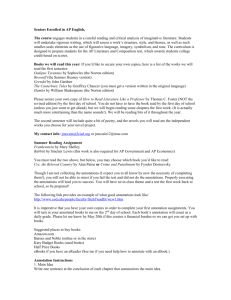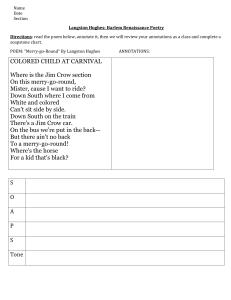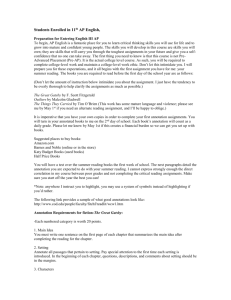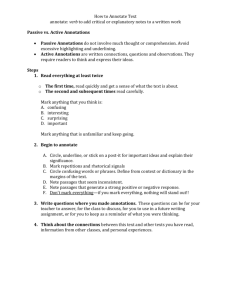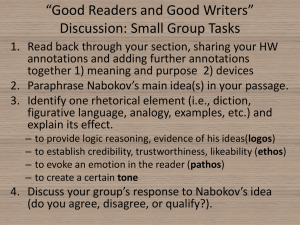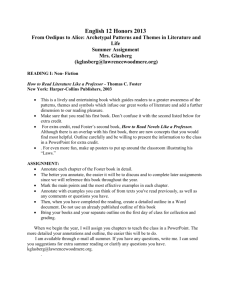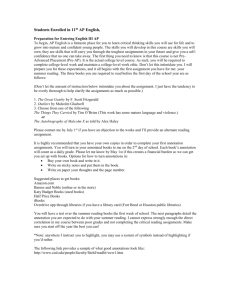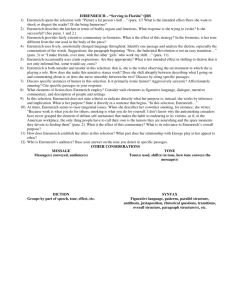Preparation for Entering English III AP
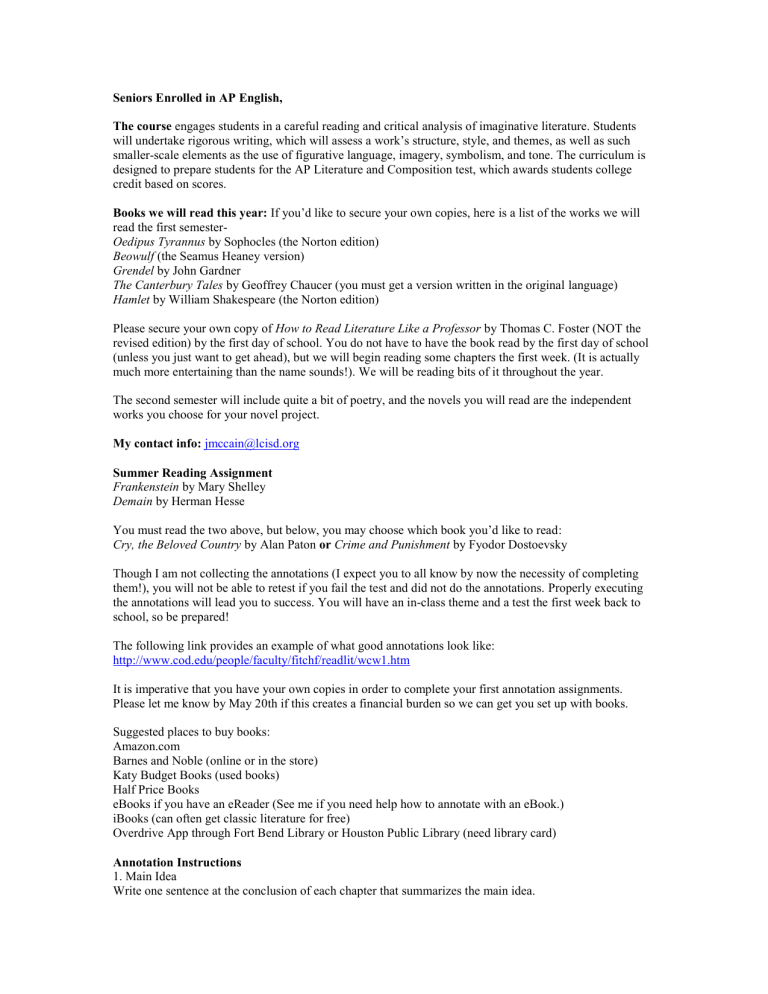
Seniors Enrolled in AP English,
The course engages students in a careful reading and critical analysis of imaginative literature. Students will undertake rigorous writing, which will assess a work’s structure, style, and themes, as well as such smaller-scale elements as the use of figurative language, imagery, symbolism, and tone. The curriculum is designed to prepare students for the AP Literature and Composition test, which awards students college credit based on scores.
Books we will read this year: If you’d like to secure your own copies, here is a list of the works we will read the first semester-
Oedipus Tyrannus by Sophocles (the Norton edition)
Beowulf (the Seamus Heaney version)
Grendel by John Gardner
The Canterbury Tales by Geoffrey Chaucer (you must get a version written in the original language)
Hamlet by William Shakespeare (the Norton edition)
Please secure your own copy of How to Read Literature Like a Professor by Thomas C. Foster (NOT the revised edition) by the first day of school. You do not have to have the book read by the first day of school
(unless you just want to get ahead), but we will begin reading some chapters the first week. (It is actually much more entertaining than the name sounds!). We will be reading bits of it throughout the year.
The second semester will include quite a bit of poetry, and the novels you will read are the independent works you choose for your novel project.
My contact info: jmccain@lcisd.org
Summer Reading Assignment
Frankenstein by Mary Shelley
Demain by Herman Hesse
You must read the two above, but below, you may choose which book you’d like to read:
Cry, the Beloved Country by Alan Paton or Crime and Punishment by Fyodor Dostoevsky
Though I am not collecting the annotations (I expect you to all know by now the necessity of completing them!), you will not be able to retest if you fail the test and did not do the annotations. Properly executing the annotations will lead you to success. You will have an in-class theme and a test the first week back to school, so be prepared!
The following link provides an example of what good annotations look like: http://www.cod.edu/people/faculty/fitchf/readlit/wcw1.htm
It is imperative that you have your own copies in order to complete your first annotation assignments.
Please let me know by May 20th if this creates a financial burden so we can get you set up with books.
Suggested places to buy books:
Amazon.com
Barnes and Noble (online or in the store)
Katy Budget Books (used books)
Half Price Books eBooks if you have an eReader (See me if you need help how to annotate with an eBook.) iBooks (can often get classic literature for free)
Overdrive App through Fort Bend Library or Houston Public Library (need library card)
Annotation Instructions
1. Main Idea
Write one sentence at the conclusion of each chapter that summarizes the main idea.
2. Setting
Annotate all passages that pertain to setting. Pay special attention to the first time each setting is introduced. Keep in mind that setting applies to time, physical place, and lifestyle/social environment.
Think in terms of what you would physically see if the action were brought to life (in film or on stage) from the pages of the book. Pay special attention to the first time each setting is introduced. In each chapter, questions, descriptions, and comments about setting should be in the margins. Noteworthy things to mark for setting:
-Where is the piece of literature set? (geographically)
-City or country? Look at descriptions of the natural, residential, and commercial areas to
glean this information.
-Are the characters indoors or outside?
-Any words that establish mood-for example, what is the weather?
-Particular season? Do descriptions about foliage give an indication if the author doesn’t directly
state it? See if any of the events going on give clues to a season.
-Time of day? Look for descriptions of light and dark, what meals people are eating, and what
actions they are taking.
-Year? Does anything tip off the year if it is not directly stated?
-Month? If the specific month is not provided, is a holiday celebrated that gives you an idea?
-Era? Does it give an indication of a period of time by the style of dress, the language being used, or of the events taking place?
3. Characters
As you read, annotate passages directly and indirectly characterizing the main characters. In the margin directly beside the passage, write the name of the character about whom you are annotating. Noteworthy passages relating to character include the following information:
-The first time a character is introduced
-Character description (a particular dominant trait or several characteristics)
-The character’s values, motives, goals, and beliefs
- How the character interacts with other characters
- How the character compares to other characters
- The character’s thoughts and actions
- Contradictions in the character’s thoughts, words, or actions
(These are the prompts you should answer in the margins)
After completing the book, inside the front cover of the book, write a character list of the main characters along with a short character description. Include at least two page references to key scenes or moments of character development.
4. Vocabulary
As you read, locate unfamiliar words. Circle these unfamiliar words in the text. In the back cover of your book, start a vocabulary list. List all circled unfamiliar words, the page # on which each was found, and the dictionary definition (denotation) of the word.
On the back cover, write five words that indicate the author’s tone. Also, circle this list and then put one word that describes the tone below it.
5. POV
Identify the author’s point of view, and determine the significance of it. Also, categorize the narrative voice; what is accomplished by the choice of narrator?
6. Style
Mark diction, and identify the type:
Possible words to describe diction:
Monosyllabic, polysyllabic, connotative, denotative, formal, informal/standard, colloquial, euphonious, cacophonous, clichéd, slang, pedestrian, pedantic, vulgar, hyperbolic, understated, concrete,
abstract, active, passive, concrete, abstract, literal, figurative, objective, or subjective
Mark tone, and identify the type.
Make note of the author’s organization of the content. Mark shifts.
Mark special syntax. This includes word order, sentence length, punctuation, and sentence parts (mainly subjects, verbs, clauses, and phrases.
To study an author’s style, always be aware of the language the author is using. Is it descriptive, flowery, and romantic, or is it concise, terse, or economic? Are the sentences complex in structure, brief and simple, or to the point? Is the language poetic? Consider poetic devices like simile, metaphor, alliteration, etc. Notice any imagery. Make note of particular diction and where the author’s word choice is especially effective. Make note of any use of dialect or regional accents.
Note any use of elevated vocabulary and look up words you don’t know. Make note of how the language affects you as a reader.
7. Literary elements
The trick here is not just to identify them but to establish what they mean and how they function.
8. Questions/Comments Mark passages that intrigue, please, displease, or confuse you.
Ask questions in the margins, make comments—talk back to the text. Since you are reading the novel over the summer, these questions will be of special value during class discussion. These questions and comments need not be limited to the text. Successful readers make text-to-world connections, text-to-text connections, and text-to-self connections as they read. If a character reminds you of your Uncle Fred, it is perfectly acceptable to write in the margin, “Uncle Fred.” If you are reminded of another book, movie, or television show, write the connection in the margin. If you think of something going on in the news or the world or have a question about how a passage may relate to the world, put that in the margin, as well.
The summer reading assignment will truly give you the foundation to help you achieve great success in the course. I hope you all enjoy the summer, and I look forward to seeing you soon. Please contact me with any questions you may have-jmccain@lcisd.org or jmccain12@mac.com.
Enjoy!
Sincerely,
Julie McCain
AP English teacher
